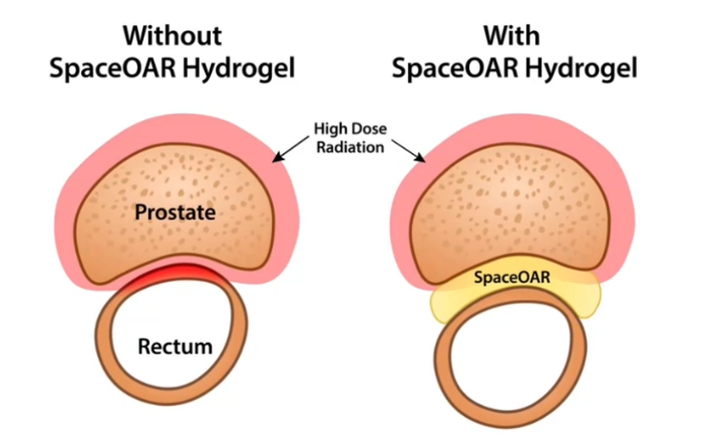News
Southampton clinicians use new gel injection to reduce side effects for prostate cancer patients
21 October 2019

News
21 October 2019

Clinicians in Southampton are using a pioneering gel injection that can reduce the side effects of radiotherapy for prostate cancer patients.
Known as SpaceOAR hydrogel, it reduces the amount of radiation that can pass through the prostate and damage the rectum during treatment.
It consists mainly of water and is injected prior to the start of radiotherapy and is naturally absorbed by the body around six months after implantation.
Radiation exposure to healthy tissue can cause life-changing long-term side effects, such as rectal pain, bleeding and diarrhoea. SpaceOAR has been clinically proven to reduce rectal irradiation by more than 70%.
Prostate cancer is the most common cancer in men, with more than 40,000 new cases diagnosed in England each year.
Radiotherapy is among the treatment options available and involves targeting high-energy x-rays at the prostate which destroy cancer cells and preventing them from spreading.
However, as the radiation is not absorbed by the prostate, it means nearby healthy organs and tissue can be affected – which the hydrogel can prevent by protecting the surrounding area.
The innovation has been fast-tracked by NHS England as part of the Innovation and Technology Payment programme designed to accelerate the adoption of proven and affordable innovations as set out in the NHS long term plan.
“This is great news for prostate cancer patients who now have the opportunity to undergo radiotherapy while minimising the risks of potential side effects,” said Tim Dudderidge, a consultant urological surgeon at University Hospital Southampton.
“This is obviously a major concern for men who are due to undergo radiotherapy as part of their treatment, so the hydrogel spacer, which is clinically proven to lower radiation exposure to the surrounding organs and tissues, it a really positive development.”
He added: “The introduction of advancements like this is so important as it gives patients the confidence we are not only are we doing our best to treat the cancer but also that we are protecting long-term quality of life.”
The 15 Academic Health Science Networks (AHSN) across England have responsibility for driving up the use of SpaceOAR hydrogel for appropriate patients in local hospitals, with the Wessex AHSN helping to support the rollout at UHS.
It is being introduced on a limited basis for those patients most at risk of damage until full NHS commissioning is approved.
Joe Sladen, associate director at Wessex AHSN, said: “It’s great news that patients are benefitting from SpaceOAR in Southampton.
“We’re very proud to support innovations which improve patient quality of life, reduce harm and help people get better quicker.”
Simon Stevens, chief executive of NHS England, said: “This further advance in NHS care for prostate cancer means patients will have safer treatment with fewer side effects. It is another step forward in world-class cancer care.”
Impact
SpaceOAR™ Hydrogel is clinically proven to minimise urinary, sexual, and bowel side-effects of radiation therapy. There are over 60 clinical publications on SpaceOAR, including a 222-patient prospective multicentre randomised clinical study with three-year follow up data which demonstrated:
Control patients were eight-times more likely to experience a decline in bowel, sexual or urinary quality of life compared to the SpaceOAR arm.
As a result, follow-up care costs including for physician visits, endoscopy procedures, hospital stays and medication can be reduced.
Over 35,000 patients worldwide have benefitted from the SpaceOAR hydrogel procedure and there are currently nine NHS hospitals using SpaceOAR.
Share
Need more information?
Contact the communications team:
(023) 8202 0858